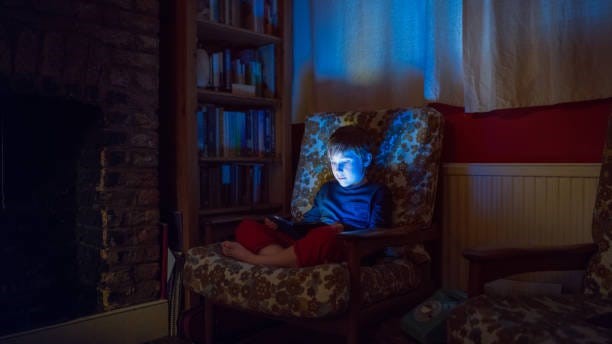A harmless show?
I knew the theme song, the names of all the pups, and I enjoyed watching the program with our eldest son. It was a harmless show about pups saving the clumsy citizens of Adventure Bay. I was alarmed when I sat back and looked at my son, watching the pups rushing to save a citizen to an upbeat theme song: he was completely zoned out, unresponsive and unaware of what was happening around him. When it was time to switch off the TV, he craved more, sometimes ending up in tears. Something was clearly not right.
The growing concern: screens everywhere
With over a decade of international teaching experience and a deep commitment to my children’s education and development, I am increasingly concerned about the impact of screen time on mental health, particularly on young minds. This pressing issue is a frequent topic of discussion among my friends and colleagues. Recently, I read ‘The Anxious Generation’ by Jonathan Haidt, a book that has sparked important conversations among parents and teachers at my school about reducing children’s screen time and reconsidering social media use.
For international students, engaging in meaningful friendships and diverse communities is essential for their well-being and sense of belonging. It’s vital for them to feel safe and connected to their international community. Today, I want to discuss our efforts to educate ourselves, enabling us to make informed decisions about our children’s screen exposure and increasing face-to-face interactions.
The ubiquity of screens and their impact on mental health
In our digital age, screens are ubiquitous. From televisions to tablets and smartphones, children are constantly exposed to various forms of media. While some content can be beneficial, the majority of TV programs, shows, and social media platforms are designed to captivate and retain attention in ways that can be harmful to developing brains. Research has shown that excessive screen time can lead to anxiety, ADHD, and social-emotional issues, mirroring the addictive qualities of a drug.
If screen time is not managed from a young age, and if parents don’t teach their children responsible screen use, we risk setting them up for social failure and mental health issues.
Why take my word for it?
If you were wondering about credentials, here are mine. I believe I am a solid source of information about screen time and parenting. I hold a Bachelor’s degree in Commerce and a Postgraduate Certificate in Education (PGCE). With 12 years of international teaching experience, I have taught students (Math, Computer Science and English) from Year 1 to Year 12, witnessing firsthand the impact of screen time on mental health, even more so for children.
As a parent of two young boys, I have also observed how screen time affects children in a home setting. This dual perspective as an educator and a parent has equipped me with valuable insights into the challenges and effects of screen time on children’s brain development, language development and well-being. My extensive background in education and personal experience as a parent drives my commitment to sharing informed and practical advice on managing exposure to screens effectively.
Analyzing children’s shows: my approach
I have taken the initiative to review 60-second clips of popular children’s shows, both entertainment and educational. My analysis is based on an article published by the National Library of Medicine that explains how certain children’s shows are designed to be addictive, using techniques similar to those found in gambling. This includes: rapid scene changes, bright colors, engaging sounds, and constant movement within the frame. Based on these criteria, I rate each show and inform parents, teachers, and other adults about whether a program is beneficial or detrimental to a child’s development (Klimova & Maresova, 2023).
To provide a clear illustration of how children’s shows can vary dramatically in their pacing, content, and potential impact on young viewers, I’ve conducted a side-by-side comparison of two popular programs: ‘Peppa Pig’ and ‘Puffin Rock’.
The table below highlights key aspects such as scene changes, sensory input devices etc. This 60-second comparison aims to help parents and caregivers make more informed decisions about the media their children consume. Consider using this table as a guide when selecting shows, opting for those that promote calm, thoughtful engagement over those designed to be overly stimulating and addictive.
Overstimulation, screen time and its effects on the brain
The findings are sobering. Many of the most popular children’s shows are fast-paced, with rapid scene changes, overwhelming sensory input, and content designed to keep children hooked rather than informed or educated. Such shows can overstimulate young minds, making it difficult for children to focus on less stimulating, real-world activities and interactions. This constant bombardment can lead to increased levels of anxiety and attention deficit issues, disrupting their ability to learn and develop social skills. It’s no surprise that the global prescription of ADHD medication to children has significantly increased over the past couple of decades. According to a study published in the Journal of Child Psychology and Psychiatry, the worldwide prevalence of ADHD medication use among children rose by 66% between 2001 and 2015 (Hinshaw & Scheffler, 2018).
Creating helpful lists: good and bad shows
To combat this, I have started to compile a list of ‘good’ and ‘bad’ shows using the 60-second review process. These lists are not static: they are continuously updated as new programs emerge and as I review additional content. My goal is to help parents and educators make informed decisions about the media their children consume.
In addition to the lists, I actively share my insights, good reads and podcasts on Substack, Linkedin and Twitter/X. By leveraging social media, I aim to reach a broader audience and spread awareness about this critical issue.
A call to action: protecting young minds
I urge all parents, teachers, and caregivers to be vigilant about the media their children consume. By choosing content wisely and limiting screen time, we can help ensure that our children grow up in a healthy, balanced environment free from the adverse effects of fast-paced, sensationalized media.
Below are some positive steps you can take as a caregiver or teacher. I have included a list of books my wife and I are reading, along with a checklist for selecting suitable programs for your children. Additionally, there are actionable tips to help parents who find it challenging to set screen time boundaries at home.
Checklist for kids’ shows
Use this checklist to evaluate the suitability of children’s programs:
- Pacing: Is the show fast-paced with rapid scene changes, or does it have a slower, more deliberate flow?
- Content quality: Does the show offer educational value or positive messages? Is the behavior something you want your child to imitate? Do the producers value dialogue and positive interaction between the characters?
- Sensory overload: Are there bright colors, flashing lights and loud noises that could overwhelm a young viewer?
- Addictive elements: Does the show use cliffhangers or dramatic music to keep children hooked?
Actionable tips
1. Set screen time limits: Create a balanced schedule with ample time for outdoor play, reading, and face-to-face interactions.
2. Create media-free zones: Designate areas in your home, such as the dining room and bedrooms, as screen-free spaces.
3. Engage in co-viewing: Watch shows with your children and discuss the content to enhance understanding and connection.
4. Promote alternative activities: Encourage hobbies and activities that do not involve screens, like sports, arts and crafts, and family board games.
5. Stay informed: Regularly update yourself on the latest research and recommendations regarding screen time and children’s development.
By taking these steps, I believe we can foster a healthier, more enriching environment for our children, ensuring they develop the skills and resilience needed to thrive in an increasingly digital world.
Further reading on screen time and mental health
1. The Anxious Generation by Jonathan Haidt: A pivotal read for understanding the broader context of screen time and its impact on young minds.
2. Glow Kids by Dr. Nicholas Kardaras: This book delves into the addictive nature of screen time and offers practical solutions for parents and educators.
3. Reset Your Child’s Brain by Dr. Victoria L. Dunckley: A guide to reducing the negative effects of screen time through a four-week program.
Reference list
Haidt, J. (2024). The Anxious Generation. Penguin Press.
Hinshaw, S. P., & Scheffler, R. M. (2018). ‘ADHD in children: The rise in worldwide prevalence and medication use’. Journal of Child Psychology and Psychiatry, 59(3), 215-223.
Klimova, H., & Maresova, P. (2023). ‘Early and persistent exposure to screen time and its relationship with addictive behaviors’. Journal of Behavioral Addictions, 12(2), 347-360. https://doi.org/10.1556/2006.12.2023.14
You can connect with our guest blog author, Adrian Strooberg, on:
- LinkedIn: Adrian Strooberg
- Substack: @AdrianStrooberg
- Twitter/X: @Mr_Strooberg




